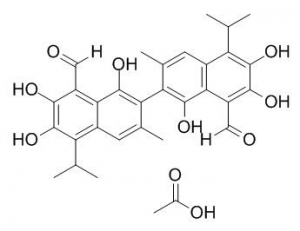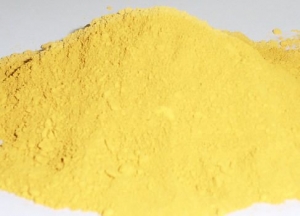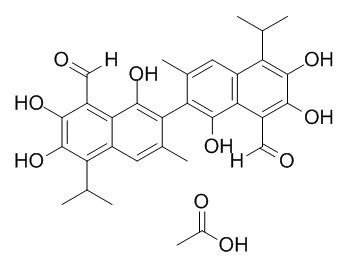What is acetate gossypol?
Acetate gossypol is a natural product that has been shown to induce infertility in guinea pigs and humans. Gossypol binds to the Bcl-xL and Bcl-2 proteins and has a Kis of 0.5-0.6 mM. In a study on gossypol, the drug produced significant reductions in pituitary cell size, degranulation, and hypertrophy. The rat pituitary cells exhibited a progressive regression, and gonosomatic indices of the sex accessory glands were reduced. The seminiferous tubule diameter decreased significantly with acetate gossypol administration. Acetate gossypol also reduced the number of Sertoli cells.
Acetate gossypol inhibits the growth of Raji cells and induces apoptosis. In addition, the drug causes the cell cycle to stop at G0/G1 phase and activate caspase-3. A flow cytometry study showed that gossypol acetate reduced the expression of the Bcl-2 protein. Its effects on the Raji cell lineage were similar to those reported in mice.

Gossypol Acetate is a natural compound isolated from the cotton plant. Its active component accounts for about 1.5% of the cotton seed’s weight. It is primarily used as a medicine and helps control spermatogenesis in both male and female species. It has antitumor activity and has been shown to be effective in cancers of the bladder and adrenal cortex. Gossypol is also used as a contraceptive for men.
The drug gossypol acetate is an orally bioavailable solvate of gossypol. It binds to the hydrophobic surface binding groove BH3 of anti-apoptotic proteins and inhibits the proliferation of tumor cells. It has a variety of anti-tumor properties, and is being investigated for its efficacy as a single agent for multiple myeloma.
Research on gossypol acetate reveals that it induces apoptosis in primary cultured ALL and CLL cells. It also has a synergistic effect with dexamethasone, inhibiting the growth of both Raji and mononuclear cells. Further, gossypol acetate affects the survival rate of Raji cells. The compound is also effective in inhibiting Raji cells, but is less effective against B cell cancers.




